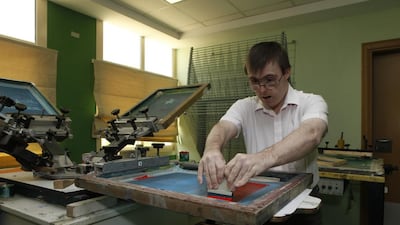Children with special needs must have advocates. Not superheroes, but people who think social justice is important for those with physical or mental disabilities.
Take the example of Fujairah’s police force. Last year some of its members became accidental inventors and advocates of the disadvantaged. With their invention, Makani, a device which detects when disabled parking bays have been taken by able-bodied motorists, the police force became powerful advocates of the disabled. Makani, meaning “my place”, is an idea that could be used within education as well.
There are some centres in this country that cater to students who have learning disabilities such as autism and dyslexia, but in terms of offering a real school experience or educational opportunities – where students who are deaf, blind or have cerebral palsy, can learn and grow – there is a deficiency.
This is a shame, because among them are an untapped source of human potential and talent.
Haben Girma, a 26-year-old deaf and blind disability rights advocate, who was named the Champion of Change by Barack Obama, is an example of what happens when one is afforded support and educational opportunities. She is also a testament to the importance of having advocates. In her case, they were her parents.
Born in Eritrea, she had lost almost all of her vision and hearing by the time she turned five.
Fortunately for Ms Girma, her parents took her from doctor to doctor after they emigrated to the US. One told them about a school that would help her develop her skills even if her sight and hearing could not be saved.
Without a proper system of education in place, together with the appropriate resources to make it easy for disabled persons to achieve, Ms Girma could have ended up like many others: locked in the silent solitude of their own thoughts. Sadly, there are occasions when doors are shut in the faces of the parents of disabled children when they seek out a private school.
Then, there are others, who from the sheer stress of hitting endless dead ends become sick with worry.
Umm Warda is one such case. After six years of struggle, Warda finally got a cochlear implant so that she could hear.
However, this little girl from Kenya was refused entry to school.
Her mother, who was her sole defender, one day woke up and couldn’t move her legs. And so, she gave up her daughter to her sister, who is still waiting to hear from the only school in her emirate that has facilities for deaf children.
Opportunity and resource are the two determining factors in the lives of both Ms Girma and Warda. Each had strong advocates, but one, perhaps didn’t have enough.
According to an old saying, “it takes a village to raise a child”. More aptly, it takes a group of advocates to make sure that a child thrives and flourishes. Hopefully, one day there will be more people who are willing to stand up for little girls like Warda, an unlit candle waiting to add her little light to UAE’s shine.
Maryam Ismail is a sociologist and teacher who divides her time between the US and the UAE

